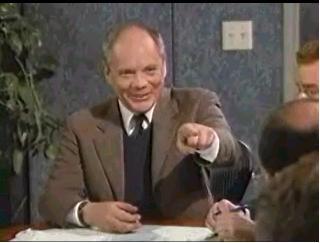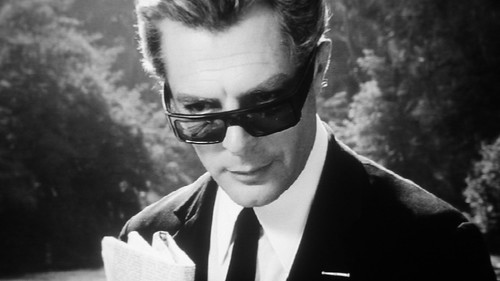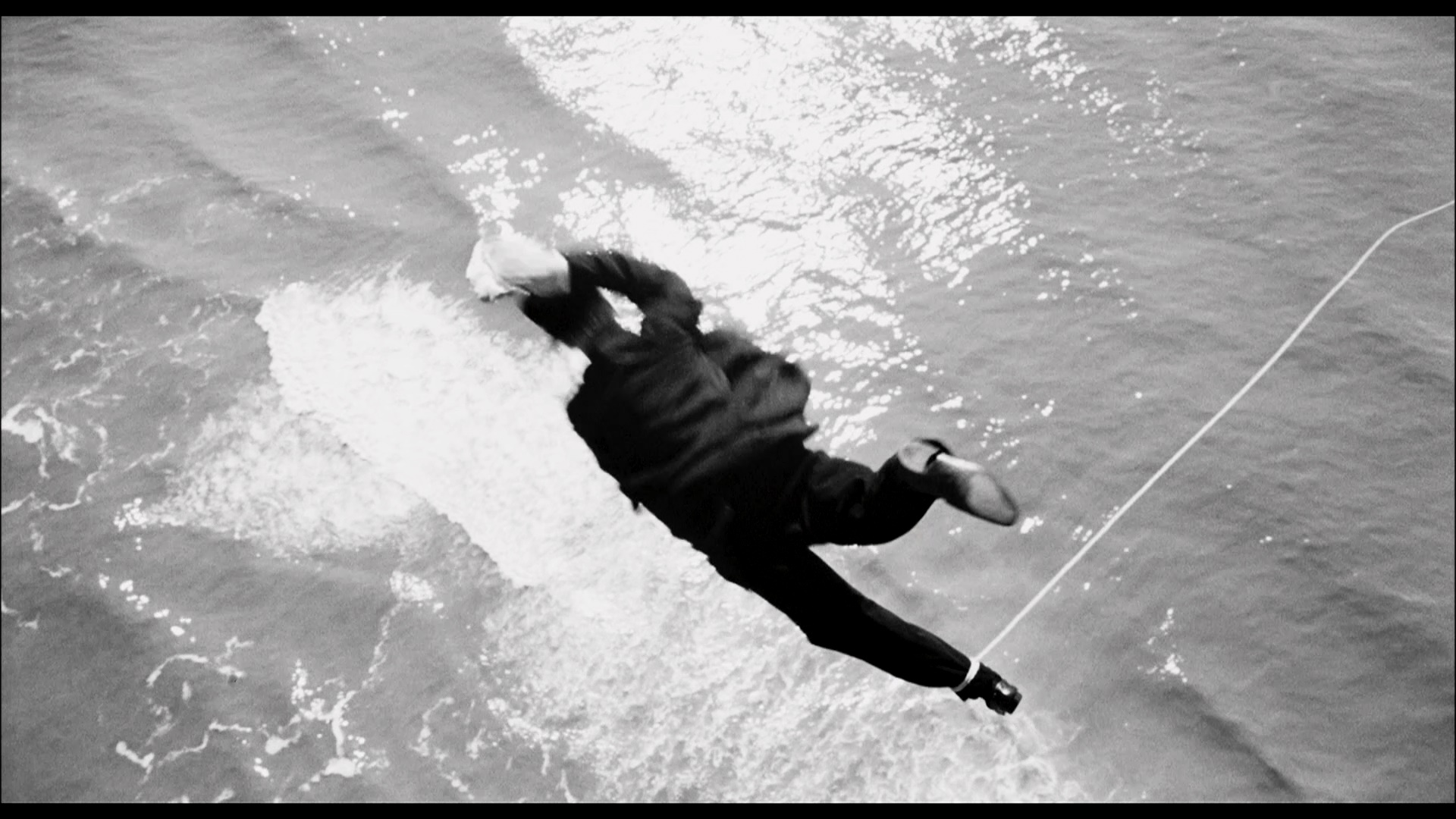Link time! Death to Super-Serious Superheros!

Here's a good blog write up on the death of the superhero movie by Ali Arikan over at Cerebral Mastication, a great film blog. Check it out. As someone who knows little to nothing about comic books, I enjoyed it thoroughly. My two cents about the death of the genre after the jump...
I agree about the "seriousness" of comic book movies these days kind of tarnishing the genre. Of course, I was a fan of the The Dark Knight, but not for the same reasons that the emo thirteen year-olds were. I would over hear conversations in the lobby about what a profound movie it was, and how "sweet" the movie was, because "it was totally like a metaphor for terrorism". I don't know, maybe I'm just getting old, but the majority of the films fans (teenagers) wanted to claim the film held up metaphors and social commentary for the audience to ponder, which the film clearly couldn't support.
However, the film is great for taking the superhero movie out of the superhero realm and moving it to an noirish setting. I am not much of a comic book guy, so when movies are really comic booky (ie required inside knowledge to know what the hell is going on), I just don't get it, but hey as long as it's aesthetically pleasing and well made (like Dick Tracy) then I'm down. But what I can't stand is the kind of superhero film that wants me to know how serious and brooding its hero is (ahem, Superman Returns), those movies just plain suck. Superman Returns may have been one of the most boring suckfests I have ever sat through, and was more of an insult to Christians (we get it, Superman is like Jesus) than Bill Maher's Religulous.
The not-so-serious tone is what I actually kind of liked about Spider-Man 3, even though the film was flawed, and way to long, the emo Peter Parker was hilarious; especially the 'strut' scene. It was an example of a film not taking itself too seriously and having a little fun, which hey, isn't that what comic books are all about? I still haven't seen Iron Man I understand that the film kind of does the same thing with being a great comic book movie; just simple fun. I mean yes, some of them try to tackle bigger ideas and themes, but like Ali talks about with X-Men do we have to actually make the film about those ideas? Can a superhero film really stand up to the same themes as a more serious, contemplative drama? I don't know, but it's what kind of turned me off of X-Men 3. The second film was a wonderfully executed action film, but the third film tried way too hard to cram way too much into less than two hours.
And maybe that's the problem these days: length. Every superhero film tries to either cram too much of a story in (seriously, there are about six different two-hour films that could be made about the X-Men members; that's excluding Wolverine) to too short of a running time (like the aforementioned X-Men films) or they try to prove their mettle by overstaying their welcome and making their films the length of a Terrence Malick or Paul Thomas Anderson picture. Maybe these directors think that if their film is as long as these serious dramas, then maybe audiences will take them seriously. Serious or not, audiences are still going to pay money to see Spidey, Superman, Batman, and Wolverine; no need to make us sit through epic lengths for us to get our fix.
Anyway, that's a lot of rambling from me. Great write up by Ali, though. The superhero film does seem to be on the decline in quality. I attribute this to an over satiated audience, who, no matter what kind of superhero film is released, they'll gladly plop down the 10 bucks to go see it. As long as there is a demand for it, there will be more good, sometimes flawed, but always overly long superhero movies like Spider-Man 3 and The Dark Knight. I just don't know which I prefer, the comic book films that are cheesy and clearly drawing upon a more classic aesthetic, ala The Phantom, Dick Tracy, The Shadow, etc., or the more 'serious' darker films like Batman Begins/The Dark Knight, Spawn, Hellboy, etc.
Both styles of comic book film clearly draw upon postmodern elements; the first group draws upon the nostalgia that Frederic Jameson so eloquently talks about in his book Postmodernism, or, The Cultural Logic of Late Capitalism, but wait....I'm doing what those that praise The Dark Knight are doing....I'm attaching something this deep to a film like The Phantom? Seriously? Well, you can't deny that films like it use that nostalgia to create a a more clear cut comic book world, whereas the darker films like the second group I listed above like to place their characters in seedy cities with noirish art direction surrounding them; this placement allows the audience the opportunity to ponder these more serious metaphors because the characters exist in tangible and recognizable cities like Chicago and New York. By taking the characters out of this fantasy world they are trying to pull something off that is impossible, because no matter how serious they want their comic book movie to be, it's still about a guy wearing a bat suit, or about mutants who control the weather.
Okay, wow. I wasn't planning on rambling on and on about this topic that much. Hopefully what I said makes a little bit of sense, but what do you all think? Is the superhero film dying? Head over to Ali's blog and read his piece and comment. Throw your comments in here too. I'd love to hear what you all think.







 Clunky plot aside there are some real striking images in the film. Soavi has a great eye for framing scary shots. For instance when the owl-masked killer is approaching one of the actors we get a POV shot from the victim, which makes the scene much scarier than if it were from the killers point of view and all we saw was the blood spewing forth. This sense of dread and waiting for the horrible inevitability of death is something that Soavi taps into and makes the film more intense than its contemporaries.
Clunky plot aside there are some real striking images in the film. Soavi has a great eye for framing scary shots. For instance when the owl-masked killer is approaching one of the actors we get a POV shot from the victim, which makes the scene much scarier than if it were from the killers point of view and all we saw was the blood spewing forth. This sense of dread and waiting for the horrible inevitability of death is something that Soavi taps into and makes the film more intense than its contemporaries.

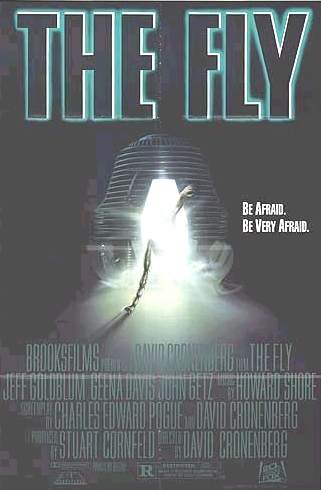
 The story is simple enough: Seth Brundle (Jeff Goldblum) is a genius physicist who has created a way to transport matter. Geena Davis plays Veronica, a reporter who is looking for an exclusive on Brundle's invention. Fearful that his secret will leak to the scientific community (which will cost him thousands) Brundle pursues Veronica at her office and pleads with her to not write the story until he has everything working for certain. Thus begins their relationship which soon blossoms into a romance. Veronica is just getting out of a relationship with her pretentious, yet caring, editor Stathis (played by the always smarmy John Getz) who is immediately jealous of the Veronica hangs on every word Brundle says. This was probably his affect on her sometime in the past. One night Veronica leaves Brudle's place to finalize some things with Stathis, however, Brundle too is weary of why she must leave and gets drunk, which leads to "something going wrong in the lab. Very wrong." You know the rest of the story from there.
The story is simple enough: Seth Brundle (Jeff Goldblum) is a genius physicist who has created a way to transport matter. Geena Davis plays Veronica, a reporter who is looking for an exclusive on Brundle's invention. Fearful that his secret will leak to the scientific community (which will cost him thousands) Brundle pursues Veronica at her office and pleads with her to not write the story until he has everything working for certain. Thus begins their relationship which soon blossoms into a romance. Veronica is just getting out of a relationship with her pretentious, yet caring, editor Stathis (played by the always smarmy John Getz) who is immediately jealous of the Veronica hangs on every word Brundle says. This was probably his affect on her sometime in the past. One night Veronica leaves Brudle's place to finalize some things with Stathis, however, Brundle too is weary of why she must leave and gets drunk, which leads to "something going wrong in the lab. Very wrong." You know the rest of the story from there.
 Yet, through all of the grotesqueness, Veronica still loves Brundle. And for all of the grotesqueness, the audience is still emotionally invested in the story; that is the triumph of The Fly and what Cronenberg is able to accomplish. Also, Cronenberg is able to conjure up suspense by element of surprise; we are never quite sure, once Brundle's metamorphosis takes place, what he is going to look like, or bad it's going to be. By keeping the audience guessing, the film does have a true horror genre feel to it, but it transcends the genre and cuts through the grotesque appearance of Brundle by maintaining the human element; the love Veronica has for Brundle, and him wanting her to remember him as he was, not what he is becoming.
Yet, through all of the grotesqueness, Veronica still loves Brundle. And for all of the grotesqueness, the audience is still emotionally invested in the story; that is the triumph of The Fly and what Cronenberg is able to accomplish. Also, Cronenberg is able to conjure up suspense by element of surprise; we are never quite sure, once Brundle's metamorphosis takes place, what he is going to look like, or bad it's going to be. By keeping the audience guessing, the film does have a true horror genre feel to it, but it transcends the genre and cuts through the grotesque appearance of Brundle by maintaining the human element; the love Veronica has for Brundle, and him wanting her to remember him as he was, not what he is becoming. I wrote all of this with a bias as the driving force. There is something deep and profound and moving about this film that affects me so much. I haven't even mentioned that when we get to see the Brundle Fly at the end of the film, it is truly one of the scariest moments in horror. The final moments of the film are scary, no doubt, and if you haven't seen the film, and are not a fan of the usual stab and slash type of horror film, then rent The Fly. It's a brilliantly crafted, sophisticated horror film.
I wrote all of this with a bias as the driving force. There is something deep and profound and moving about this film that affects me so much. I haven't even mentioned that when we get to see the Brundle Fly at the end of the film, it is truly one of the scariest moments in horror. The final moments of the film are scary, no doubt, and if you haven't seen the film, and are not a fan of the usual stab and slash type of horror film, then rent The Fly. It's a brilliantly crafted, sophisticated horror film.
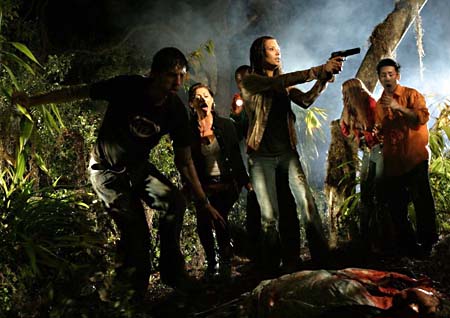
 The story: In the New York and New Jersey areas there is a famous legend of a man named Cropsy who terrorizes campers. Of course he only does this because, SPOILER ALERT, he was teased as a child at the very same camp. No way! Okay, so the story is a wee bit uninspired, in fact it's typical 80's slasher fodder, but the "raft" scene is pretty damn cool if you can find it. I think there might be some clips of it on youtube, and rumor has it that even though the recently released MGM version on DVD says it's the complete uncut version....apparently it's not. But I haven't seen it on DVD, so I can't say one way or the other.
The story: In the New York and New Jersey areas there is a famous legend of a man named Cropsy who terrorizes campers. Of course he only does this because, SPOILER ALERT, he was teased as a child at the very same camp. No way! Okay, so the story is a wee bit uninspired, in fact it's typical 80's slasher fodder, but the "raft" scene is pretty damn cool if you can find it. I think there might be some clips of it on youtube, and rumor has it that even though the recently released MGM version on DVD says it's the complete uncut version....apparently it's not. But I haven't seen it on DVD, so I can't say one way or the other. If The Burning was kind of an above average 80's slasher, then Hatchet is an above average toungue-in-cheek 21st centtury horror film. In the wake of Eli Roth's uber snarky Cabin Fever (which I have to admit made me laugh a lot....I mean come on: Pancakes!) Adam Green released Hatchet, a film not at all unlike The Burning. Hatchet is also about a killer in the woods named Victor Crowley who may or may not be an inbred monster from Hell. It's irrelevant really because the film is just one big excuse to get horror icons in cameos and kill lots and lots of people. Freddy Kreuger, Jason Vorhees, and Candyman all make appearances (okay, well the actors that played them) and really Green's film is just an exercise in reminding the audience that the filmmakers are in on the joke too.
If The Burning was kind of an above average 80's slasher, then Hatchet is an above average toungue-in-cheek 21st centtury horror film. In the wake of Eli Roth's uber snarky Cabin Fever (which I have to admit made me laugh a lot....I mean come on: Pancakes!) Adam Green released Hatchet, a film not at all unlike The Burning. Hatchet is also about a killer in the woods named Victor Crowley who may or may not be an inbred monster from Hell. It's irrelevant really because the film is just one big excuse to get horror icons in cameos and kill lots and lots of people. Freddy Kreuger, Jason Vorhees, and Candyman all make appearances (okay, well the actors that played them) and really Green's film is just an exercise in reminding the audience that the filmmakers are in on the joke too. 








